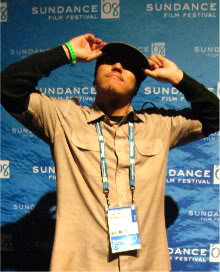Sometimes sound bites are not quite enough! We posed five questions to Tad and as promised, Part 2 of our Tadashi Nakumra posting is now here!
1. Your parents have a long career in documenting Japanese-American history and experience including the establishment of the Frank H. Watase Media Arts Center. Is your film passion to document forgotten pieces of that history a result of your mother and father’s passion?
Yes, both my parents have spent most of their lives working in the Japanese American community here in Los Angeles. Their work as filmmakers, curators and scholars has definitely shown me the importance of documenting both the historical and present experience of our community. Every community continues to evolve as each generation gets older, and as that happens, the identity of that group shifts or changes. As a filmmaker, I want to document issues or people that a young audience can connect with and get inspired by. Whether it’s an historical event or present day issue, I want that story to somehow get the viewer to actively participate in improving the conditions of people around them.
2. Your father is often referred to as “The Godfather of Asian American Media.” Do you find it intimidating to be a filmmaker who has such big shoes to fill?
We joke about it a lot, but my dad is called “The Godfather of Asian American Media” for good reason. Besides establishing the Watase Media Arts Center, he also founded Visual Communications, the first Asian American media organization, founded the Center for EthnoCommunications at UCLA’s Asian American Studies Center, and has mentored hundreds of filmmakers as a professor at UCLA. There is a lot of pressure and expectations placed on me for being Robert Nakamura’s son but I’m cool with that. None of that pressure comes from him or my family which is great. I would much rather deal with the pressure and take all the privileges that come with being The Godfather’s son, verses not have either. If you want to be an NFL quarterback, wouldn’t you want to be in Payton Manning’s position?
3. Do you see the label of Asian-American as a political statement for you or more just a ethnic/cultural identity?
Being Asian American is definitely a political identity for me. It not only provides me with a history and culture, but it also shapes the political lens that I use to analyze the world, gives me an understanding of my position in our society and allows me to make connections with many other communities. I feel that being Asian American goes way beyond a personal identity. Being Asian American means understanding that you are part of a community that is both oppressed and privileged. The challenge is to use our privileges to not only improve our own conditions, but also the conditions of people in other communities and countries.
4. You have said in the past that Chris Iijima was an inspirational person to you and you have childhood memories of his folk group Yellow Pearl, his civil rights activism and his scholarly endeavors. When he died in 2005 was that the catalyst for doing a documentary on his life or was that something that had already been brewing in your head?
Before Chris passed I felt it was important to document the historical times and events that he was a part of, but a film on his life specifically was not in motion. I thought it was really empowering to listen and see images of young, powerful and attractive Asian Americans singing about political and personal liberation. But after he died, and after attended his memorials in LA and New York, I saw the huge amount of people who were inspired by Chris directly in so many different ways. Me being one of those people, I wanted to make a film so that the people who weren’t lucky enough to know him could still be inspired by his music and wisdom.
5. You often referred to Yellow Brotherhood, Pilgrimage and A Song For Ourselves as a trilogy. Does that mean you plan to venture into other areas of filmmaking now or is your passion still focused on Asian-American history? What is the project you are working on now and when can we expect to see it?
I am still dedicated to creating films that will serve the Asian American community, but I am interested in trying to do that in different ways. After doing the trilogy on the Asian American movement I want to try and tell some more contemporary stories or document issues or events that are happening now. There are so many stories that need to be documented and told, more than any one filmmaker could do. Because of that I want to help other filmmakers tell the stories of their own community and experience.
I am currently working on a documentary film on the ukulele virtuoso Jake Shimabukuro, a young Japanese American from Hawai’i. The film is being produced by the Center for Asian American Media and it has been great working with them so far. The learning curve is pretty steep but I have a lot of great people helping me.


Recent Comments